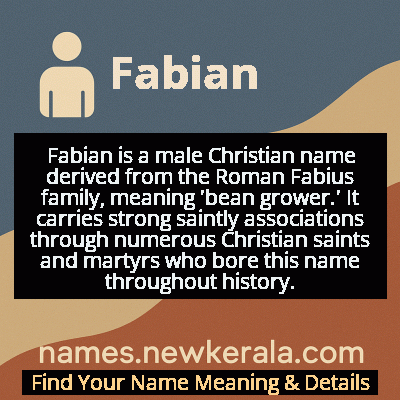Fabian Name Meaning & Details
Origin, Popularity, Numerology Analysis & Name Meaning of Fabian
Discover the origin, meaning, and cultural significance of the name FABIAN. Delve into its historical roots and explore the lasting impact it has had on communities and traditions.
Name
Fabian
Gender
Male
Origin
Christian
Lucky Number
6
Meaning of the Name - Fabian
Fabian is a male Christian name derived from the Roman Fabius family, meaning 'bean grower.' It carries strong saintly associations through numerous Christian saints and martyrs who bore this name throughout history.
Fabian - Complete Numerology Analysis
Your Numerology Number
Based on Pythagorean Numerology System
Ruling Planet
Venus
Positive Nature
Harmonious, responsible, caring, and artistic.
Negative Traits
Overly idealistic, superficial, possessive, or jealous.
Lucky Colours
Pink, turquoise.
Lucky Days
Friday.
Lucky Stones
Diamond, turquoise.
Harmony Numbers
2, 3, 9.
Best Suited Professions
Artists, musicians, teachers, healthcare workers.
What People Like About You
Warmth, nurturing nature, artistic flair.
Famous People Named Fabian
Pope Fabian
Religious Leader
Organized early Christian church in Rome, martyred for faith
Fabian von Schlabrendorff
Resistance Fighter
German officer who opposed Nazi regime, survived multiple concentration camps
Fabian Cancellara
Professional Cyclist
One of greatest time trialists in cycling history, Olympic champion
Fabian Barthez
Football Goalkeeper
World Cup and European Championship winner with French national team
Name Variations & International Equivalents
Click on blue names to explore their detailed meanings. Gray names with will be available soon.
Cultural & Historical Significance
Throughout medieval Europe, the name gained popularity due to veneration of Saint Fabian and other saints bearing the name, particularly in regions with strong Roman Catholic traditions. The Fabian Society in 19th century Britain, advocating for gradual socialist reform, further embedded the name in political discourse, associating it with thoughtful, incremental change rather than revolutionary action. This dual heritage - combining Roman gravitas with Christian devotion - has made Fabian a name that conveys both worldly wisdom and spiritual depth across Western cultures.
Extended Personality Analysis
Individuals named Fabian are often perceived as possessing a blend of traditional strength and modern sophistication. They tend to exhibit strategic thinking and patience, reflecting the historical Fabian strategy of careful, deliberate action rather than impulsive decisions. This analytical approach often makes them excellent problem-solvers who consider multiple perspectives before committing to a course of action. Fabians typically demonstrate reliability and loyalty in personal relationships, valuing deep connections over superficial acquaintances. Their Roman heritage lends an air of dignity and authority, while their Christian associations suggest moral integrity and compassion.
Many Fabians display a quiet confidence that doesn't require constant validation from others, making them natural leaders who lead by example rather than through overt dominance. They often possess a strong sense of duty and responsibility, combined with practical intelligence that allows them to navigate complex situations with grace. While they can be reserved in unfamiliar settings, those who know them well appreciate their dry wit and steadfast support during challenging times. The name suggests someone who builds lasting success through consistent effort and ethical conduct, embodying the principle that true strength lies in endurance and principle rather than flashy displays of power.
Modern Usage & Popularity
In contemporary times, Fabian maintains steady popularity across Europe and Latin America, particularly in Germany, Switzerland, Sweden, and Spanish-speaking countries. The name enjoys a sophisticated, international appeal without being overly common in English-speaking countries. In the United States, it has never reached the top 100 names but maintains consistent usage, often chosen by parents seeking a name with classical roots that sounds modern and distinctive. Recent years have seen a slight resurgence as vintage names gain popularity, with Fabian offering the appeal of ancient history combined with contemporary flair. The name is particularly popular among Catholic families due to its saintly associations, and it crosses cultural boundaries easily, working well in multilingual families. Its usage in professional sports through figures like Fabian Cancellara and Fabian Barthez has kept the name visible and attractive to younger parents seeking strong but uncommon names for their children.
Symbolic & Spiritual Meanings
Symbolically, Fabian represents the union of strength and patience, embodying the concept that lasting victory comes through perseverance rather than brute force. The name carries connotations of cultivation and growth, hearkening back to its original meaning related to bean farming - suggesting someone who nurtures and develops things over time. In Christian symbolism, it represents martyrdom and divine selection, referencing the story of Pope Fabian's election where a dove symbolized the Holy Spirit's guidance. The Fabian strategy symbolism extends beyond military contexts to represent any approach that values wisdom, timing, and strategic retreat over immediate confrontation, making the name emblematic of intelligent resistance and reform-minded thinking. The bean symbolism connects to fertility, sustenance, and the cycle of life, suggesting someone who provides nourishment and support to their community while understanding the importance of gradual development and natural rhythms.

